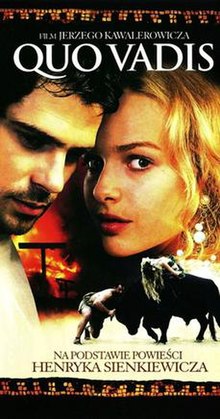Quo Vadis (2001 film)
| Quo Vadis | |
|---|---|
 | |
| Directed by | Jerzy Kawalerowicz |
| Screenplay by | Jerzy Kawalerowicz |
| Based on | Quo Vadis by Henryk Sienkiewicz |
| Produced by | Mirosław Słowiński Jerzy Kajetan Frykowski |
| Starring | Paweł Deląg Magdalena Mielcarz Bogusław Linda |
| Edited by | Cezary Grzesiuk Chuck Bush |
| Music by | Jan Kaczmarek |
Production company | |
| Distributed by | Studio Filmowe Kadr |
Release date |
|
Running time | 160 minutes |
| Country | Poland |
| Language | Polish |
| Budget | $ 18 million (ca.76 140 000 PLN) |
| Box office | 4.2 million admissions (Poland)[1] |
Quo Vadis is a 2001 Polish film directed by Jerzy Kawalerowicz based on the 1896 book of the same title by Henryk Sienkiewicz. It was Poland's submission to the 74th Academy Awards for the Academy Award for Best Foreign Language Film, but was not nominated.[2][3]
Plot
[edit]The central plot in the movie revolves around the love of a Roman patrician, Marcus Vinicius, towards a Christian girl (coming from the territory of modern-day Poland) set against the backdrop of the persecutions against Christians during the reign of Nero.
In the beginning, Lygia, a Christian and hostage of Rome, becomes the object of Vinicius' love but she refuses his advances. Vinicius' friend Petronius tries to manipulate Nero, who has authority over all Roman hostages, to give Lygia to Vinicius, but Lygia is taken into hiding by Christians. Marcus Vinicius decides to find her and force her to be his wife. He goes to a Christian meeting along with Croton, a gladiator, to find her. After following her from the meeting, Marcus tries to take her, but Ursus, a strong man and friend of Lygia, kills Croton. Marcus himself is wounded in the fight, but is taken care of by Lygia and the Christians. Seeing their kindness he begins to convert to Christianity, and Lygia accepts him.
Rome catches fire while the emperor, Nero, is away. Nero returns and sings to the crowd, but they become angry. At the suggestion of Nero's wife, the Christians are blamed for the fire, providing a long series of cruel spectacles to appease the crowd. In one of the spectacles, Ursus faces a bull carrying Lygia on its back. Ursus wins and, with the crowd and guards in approval, Nero lets them live.
Nero kills himself, and Vinicius and Lygia leave Rome.
Cast
[edit]- Paweł Deląg – Marcus Vinicius
- Magdalena Mielcarz – Lygie Callina
- Bogusław Linda – Petronius
- Michał Bajor – Nero
- Agnieszka Wagner - Poppaea Sabina
- Jerzy Trela – Chilon Chilonides
- Danuta Stenka – Pomponia Graecina
- Franciszek Pieczka – Saint Peter
- Krzysztof Majchrzak – Tigellinus
- Rafał Kubacki – Ursus
- Wojciech Olszanski - Faon
- Andrzej Zieliński - Epaphroditus
Reception
[edit]It was the most popular Polish film of the year with 4.2 million admissions.[1]
See also
[edit]References
[edit]- ^ a b Hollender, Barbara (24 December 2001). "Homegrown pix gain in Europe". Variety. p. 7.
- ^ "51 Countries In Race For Oscar". Academy of Motion Picture Arts and Sciences. 2001-11-19. Archived from the original on July 4, 2008. Retrieved 2008-08-12.
- ^ "74th Academy Awards – Nominees and Winners". Academy of Motion Picture Arts and Sciences. Archived from the original on 2008-06-22. Retrieved 2008-08-07.
External links
[edit]- 2001 films
- 2000s Polish-language films
- 2000s historical drama films
- Cultural depictions of Poppaea Sabina
- Films based on Quo Vadis
- Films directed by Jerzy Kawalerowicz
- Films scored by Jan A. P. Kaczmarek
- Films set in classical antiquity
- Films set in the Roman Empire
- Films set in the 1st century
- Polish historical drama films
- Depictions of Nero on film
- Films about Christianity
- 2001 drama films
- Cultural depictions of Saint Peter
- Films about Catholicism
- KADR films
